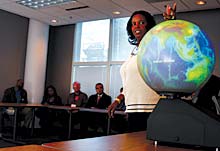While environmentalists’ discussions tend revolve around how to avert catastrophic climate change, the business world is slowly starting hatch plans for adapting to the looming repercussions of an altered climate.

Representatives from the transportation, energy and insurance industries attended a recent conference at the Grove Park Inn, hosted by the National Oceanic and Atmospheric Administration. An arm of NOAA, the National Climatic Data Center, is based in downtown Asheville’s Veach-Baley Federal Building. The agency boasts the greatest collection of weather and climate information in the world. The sheer bulk of it is astounding: The now-obsolete paper archives occupy towering racks spanning an enormous basement warehouse, not to mention the thousands of terabytes of continually updated digital information. That data, industry professionals are starting to realize, can be valuable for planning purposes. The conference was designed to help both industry and public-sector groups navigate the mountains of data and apply it to planning for an uncertain future.
The growing risk of catastrophic weather events has created new markets within the insurance industry, according to Frank Nutter, president of the Reinsurance Association of America, a keynote speaker at the event. Since Hurricane Katrina devastated New Orleans, the industry has devoted significant resources to protecting itself from future extreme weather events, he said. And other perils, such as a predicted rise in sea level, the impact of a storm surge, droughts and floods, have awakened a handful of insurance companies to the need to study up on climate change.
Another keynote speaker at the conference was Duke Energy CEO Jim Rogers, whose ideas about cutting carbon-dioxide emissions and reforming the utility industry have earned him a reputation as an environmentally conscious industrial leader (though his popularity may be lower among Asheville environmentalists, who turned out en masse last month to speak out against Duke’s proposed Cliffside power plant). Climate data can also be useful for alternative-energy companies, which can use it, for example, to calculate the optimum siting for wind farms or solar panels.
The transportation industry, on the other hand, seemed to be behind the curve. “We hardly know that you climate scientists exist—it’s just not on our radar screen,” noted nationally recognized engineer Henry Schwartz as he opened a discussion during the conference. On a list of the industry’s “areas of interest,” which Schwartz noted was in no particular order of priority, the possible opening of a Northwest Passage due to sea-ice melt appeared as the first item.
With NOAA’s climate and weather data now in high demand, local organizations are starting to wonder how the city might benefit from the data center’s presence here. The Asheville-based HUB Project is sponsoring an initiative called Climate Alive: Centers for Environmental and Climatic Interaction—a vision for a new science-and-entertainment attraction to showcase the data center and educate the public about climate change.
That effort is still in a nascent phase—to date, the HUB Project has mainly funded the production of a brochure and promotional video. Yet possibilities seem to abound, as the wealth of NOAA’s climate data can be combined with innovative tools like projection domes to put climate information in a visually compelling, easily understandable context.
During a reception at the NOAA conference, an inflatable, hemispherical dome was set up, and inventor David McConville was showing onlookers what the 10-foot-high, three-dimensional screen could do.
“This is a simulation of a major flood event,” he explained at one point. On the screen, a digital simulation displayed a bird’s-eye view of Biltmore Village during Hurricane Ivan. As the picture zoomed closer, the Swannanoa River swelled from a small blue ribbon to a roaring tide, spreading farther and farther out until virtually everything was underwater.



Before you comment
The comments section is here to provide a platform for civil dialogue on the issues we face together as a local community. Xpress is committed to offering this platform for all voices, but when the tone of the discussion gets nasty or strays off topic, we believe many people choose not to participate. Xpress editors are determined to moderate comments to ensure a constructive interchange is maintained. All comments judged not to be in keeping with the spirit of civil discourse will be removed and repeat violators will be banned. See here for our terms of service. Thank you for being part of this effort to promote respectful discussion.